

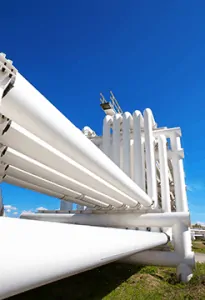
Long story short, an escapee from San Quentin and any uncontrolled methane air molecule may be more similar than we may presume. In fact, a common LDAR practice is to use an infrared imaging camera; similar to the camera often used in search of fugitive criminals.
On a serious note, fugitive emissions are something that both industry and regulators have been focused on for decades, and the past and present efforts made to limit them are no less than remarkable.
Specific to Onshore Oil and Gas Exploration & Production, the Federal Regulations applicable to fugitive emissions are fairly young. Finalized in 2012, NSPS OOOO is no longer a toddler and is in the middle of growing into NSPS OOOOa (Public Comment Deadline March 11, 2016). On a national scale, NSPS OOOOa will expand fugitive emission monitoring and control requirements (VOC’s and methane) to several facility types associated with the industry and is expected to be finalized before the close of 2016.
In California, fugitive emissions from Onshore Oil and Gas Exploration & Production have been regulated for a long time. In fact, the O&G industry in Santa Barbara County has dealt with fugitive emission requirements since 1979. Since then SCS Engineers has been assisting with fugitive emission monitoring for our valued clients. Today, SCS Engineers provides the Oil and Gas Exploration and Production industry with efficient and effective LDAR services.
So fear not, SCS Engineers is ready to supply the knowledge and skill set you need to stay compliant, maintain your operations, and respect your bottom line. Remember, unless the doors are closed, pumps are turned off, and equipment is flushed and plugged; fugitive emissions requirements and LDAR will likely still apply.
Applicability: Determining Federal vs. State oversight is the first step. Non-Major Source Oil and Gas Production facilities are either subject to NSPS OOOO (soon to be OOOOa) or a related State specific rule (i.e. Colorado Regulation 7). Once oversight is determined, then there may still be exemptions for your facility (i.e. facility constructed before August 23, 2011). And finally, once regulatory oversight is confirmed and you determine that LDAR is required for your facility, then the last step is to figure out which equipment is applicable (i.e. VOC content > 10% by weight). Basically, an applicability determination can be daunting.
Equipment: EPA’s Method 21 is historically and currently referenced in all LDAR regulations. Method 21 requires an instrument such as the Flame Ionization Detector (FID) or Photo Ionization Detector (PID). More recently the Optical Gas Imaging (OGI) Camera has been included in LDAR regulations and utilized in LDAR programs. Presently, there are several instrument technologies that exist and are in the works, but not yet mainstream in Oil and Gas sector. Ultimately, if you were to find yourself conducting LDAR monitoring at your oil and gas facility tomorrow per an established regulation, you would most likely need to use an FID or OGI.
Recordkeeping: Personally, I like the simplicity of using paper forms for field notes; however, the old-fashioned way comes with risk. The up-front and ongoing data involved with an LDAR program is too much for maintaining a paper to computer process, regardless of how organized you think you are. Therefore, a computer database platform is recommended and necessary for managing your LDAR recordkeeping. Beyond just recordkeeping, a database platform can organize schedules, alerts, generate reports, extract trends, and many other applications to help keep your LDAR program compliant. One such platform worth considering is SCSeTools™. This cloud-based software can provide the database capabilities used on the desktop, but almost more importantly, provides mobile data input capabilities with the SCS MobileTools™ application fit for Android and IOS systems. Keep the fugitives from escaping, and document containment for the authorities!
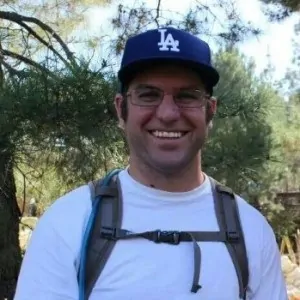
Whether you want to discuss LDAR or Dodger baseball, don’t hesitate to contact me, or SCS Engineers.
Resources:
Learn more on the SCS service pages and read SCS project case studies from across the nation to help fine tune your program.
Outside links to the EPA proposed rulemaking website:
SCS Engineers presents a behind-the-scenes look at the special people who make us thrive and the roles they play within the organization.
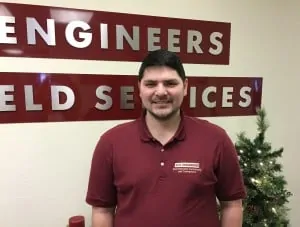
Andrew Ard’s interest in the environment started when he was a junior in high school. He took a required environmental science class and it opened his eyes to opportunities he was truly interested in pursuing. His interest led him to enroll in a five-year Environmental Engineering Master’s program at Texas Tech University. During his studies, Andrew discovered he wanted to explore more about landfill work so he seized the opportunity as an intern with the leading company in the solid waste industry: SCS Engineers.
Andrew remembers as an SCS intern, he was given the opportunity to work on projects under the supervision of engineers. Also, he was given a view of how an engineering consultancy worked and it prepared him for a career once he graduated from university. Now as a Staff Professional, Andrew enjoys a variety of projects at SCS which includes construction and design planning, while utilizing programs such as AutoCAD/Civil3D, or reviewing and implementing regulations. One of the reasons he decided to stay and start his career as a young professional after receiving his masters was the passion he saw in SCS employees.
At SCS, Andrew states that everyone is very passionate about what they do. They truly enjoy and are proud of their work. Furthermore, SCS is very fast-paced with lots of projects. Some may not enjoy the high-pressure environment, but he thrives on learning something new every day. He remarks that his supervisors assign their employees just the right amount of work and they place them in a position to succeed. Also, with SCS being an employee-owned ESOP company, Andrew really feels that he is invested in the company and its success.
For future SCSers hoping to succeed, Andrew has this piece of advice: “Make sure you ask a lot of questions. If you’re not sure about something, ask and learn; there are multiple people that you can go to with your questions. It’s a really free-thinking environment. If you are a young adult looking to get into the solid waste industry, there’s no better place to learn than SCS.”
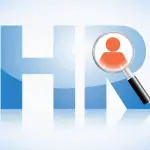
If a future with an organization like SCS Engineers and a career path like Andrew’s is something you’re interested in, please visit the SCS Careers Page for all of our available job openings.
SCS Engineers presents a behind-the-scenes look at the special people who make us thrive and the roles they play within the organization.
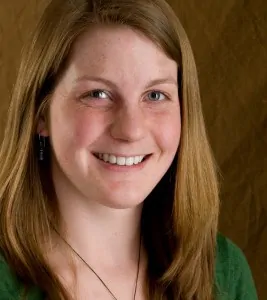
Meghan Blodgett has always been interested in science and the outdoors but it wasn’t until she took a Geology course at Amherst College that she realized she could integrate both of her interests into a career. After receiving her bachelor’s degree in Geology and her master’s degree in Hydrogeology from the University of Wisconsin-Madison, Meghan started her career at SCS Engineers as a hydrogeologist.
Meghan says her favorite aspect of working at SCS is the variety of projects that she is involved in. From large complex developments to smaller remediation assignments, Meghan has been able to work with a number of clients on very diverse sites. Working at SCS is never boring, she says. No two clients or projects are the same. Furthermore, her field is constantly evolving and she has to stay on her toes to stay ahead of new laws and regulations.
Meghan says she genuinely enjoys what she does every day. The work in the field and her interaction with the field staff is a very hands-on experience she would not have been able obtain in a classroom. She explains that while there are busy seasons throughout the year when numerous projects come up at one time, her project managers are great at distributing the workload and encouraging her to be involved in different ventures.
Management constantly inspires employees to develop professionally, so Meghan has taken additional courses and has been able to continue her education using SCS’s tuition reimbursement program. She is also preparing to take the Professional Geologist exam in spring of 2016.
When asked what has made her a successful SCSer and if she can provide advice to any future employees, Meghan states, “Don’t be afraid to speak up. If you see an opportunity you want, ask about it. If a project manager has a project you’re interested in or there is a class you want to take, don’t be afraid to go after it. The managers will most likely say yes.”

If a future with an organization like SCS Engineers and a career path like Meghan’s is something you’re interested in, please visit the SCS Careers Page to see our available job openings.
SCS Engineers presents a behind-the-scenes look at the special people who make us thrive and the roles they play within the organization.
Vice President Dana Murray recently celebrated her 20 year anniversary with SCS Engineers. Dana started at SCS Engineers after receiving her Bachelor’s degree in Civil Engineering at Old Dominion University. Initially hired as a Staff Engineer, Dana worked her way up to Project Engineer, to Project Manager, to Project Director and now Vice President.
One of Dana’s biggest roles through her years at SCS is being the Program Director for the prime contract with the Environmental Protection Agency’s Landfill Methane Outreach Program. This includes an international effort such as helping cities to reduce their methane gas output or designing landfills. She states that this is “very powerful work” and our efforts make a difference in the lives of the citizens in developing countries.
Dana attributes her long-lived success to how supportive SCS Engineers is to its associates. The management is very encouraging to their entry level engineers and employees. Also, not only are the SCS personnel smart, hard-working and passionate about their projects, they are supportive of each other’s work as well. In 1997, Dana took 5 years off to be with her children and she was welcomed back to SCS to continue her career when she wanted to return to the workforce.
In Dana’s opinion, this network of support is what sets SCS Engineers apart from other companies. The fact that SCS has almost 800 employees but still possess a small company feel is rather unique. Furthermore, Dana states that what SCS does best is giving their employees opportunity to grow. She remembers that when she was a young engineer, she craved having a project to herself. She got the opportunity because SCS is involved in a wide variety of projects.
Engineering seems to be in Dana’s blood; her father was a partner in an engineering firm, and now her two sons are both studying engineering in college. One piece of fatherly wisdom that Dana continues to take to heart is, “as long as you produce good work, it doesn’t matter if you’re male or female.” When asked if she had any like advice for future SCSers, she encourages everyone to “ask a lot of questions.” Dana continued, “employees should not hesitate to ask questions of their managers if they are unsure of what to do. Manager and employee are intended to work closely together, and only when they do, can they both succeed.”

If a future with an organization like SCS Engineers and a career path like Dana’s is something you’re interested in, please visit SCS Careers Page for all of our available job openings.
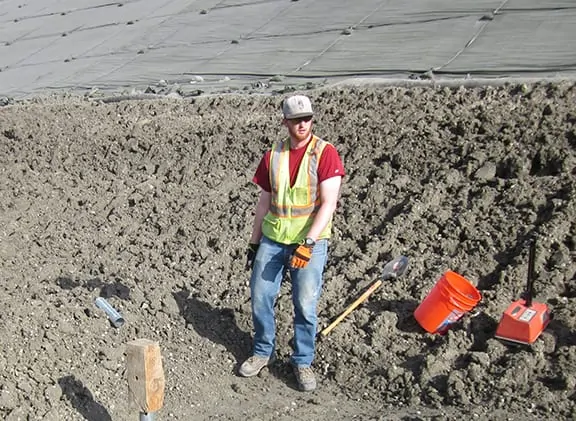
Sam began his career at SCS in September 2010, just following his graduation from Washington State University with a BS in Civil/Environmental Engineering and a background in Technical Illustration. Despite receiving job offers from larger engineering companies, Sam chose to work with SCS Engineers. When asked what attracted him to SCS over other companies Sam replied, “The main draw was the size of SCS Engineers and the ability to work on a wide variety of environmental projects.”
SCS Engineers is growing and highly rated by clients and industry. As SCS grows, the company maintains the spirit of entrepreneurship because SCS values authenticity, humanity, and creativity in individuals. Sam preferred the opportunity to expand his experiences beyond a singular practice, gaining proficiency in multiple environmental fields.
Now, after 5 years as a Staff Professional, Sam’s been involved in multiple practice areas at SCS. He has served as an integral part of a team, on a diverse range of projects from groundwater to gas monitoring to large construction. Always a problem-solver, Sam is able to combine his technical skills toward solutions in a profession he enjoys. With 5-years of experience under his belt, Sam is focusing on what interests him as a professional and the specialty area to focus the rest of his career.
His advice to future SCS employees?
“Explore and enjoy the SCS dynamic environment. Don’t think that there is just one solution to a problem: there are always newer, better, and more efficient ways to tackle a challenge. Also, find your niche within SCS and make it yours; make yourself valuable to the company’s clients.”
When asked what advice he can offer to job seekers, Sam said, “Keep your expectations realistic and be prepared to put in the work to accomplish your goals.”
Sam is currently preparing for his Professional Engineer exam in Civil: Water Resources.
Thank you, Sam.

If a future with SCS Engineers and a career path like Sam’s is something you’re interested in, please visit the SCS Career Page for all of our available job openings.